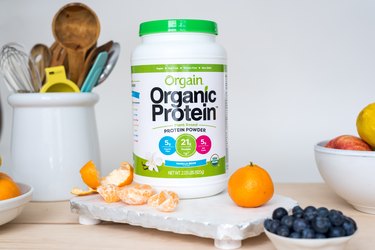
You eat right. You exercise. You prioritize sleep. You practice self-care.
The upcoming cold and flu season, coupled with the ongoing COVID-19 pandemic, means you're probably focused on keeping your internal defenses in tip-top condition. The immune system defends the body against disease by fighting infection, says Acacia Wright, RD, CD, Nutrition Communications and Support Manager at Orgain. These cells and organs operate in concert to hunt down and destroy dangerous pathogens.
Video of the Day
Video of the Day
Diet, exercise, sleep and stress management work together to protect immunity. "If you're not getting adequate sleep, that will offset the function of the immune system," she says. "If you don't take in adequate vitamins and minerals, it impairs the immune system. These components all support each other."
From making sure you get enough protein so your body can create infection-fighting antibodies to biohacking your way to more restful sleep, find out how to level up your healthy habits.
1. Upgrade Your Grocery List

"Diet plays an integral role in immunity," says Wright. "Even small deficiencies in protein, vitamins B, C and D and zinc have been shown to impair the immune system." To stay healthy during the flu season, she suggests eating colorful fruit and vegetables, lean protein, whole grains and healthy fats.
Protein builds and repairs tissue in the body. "You need protein to make antibodies," says Wright. "And if you don't have enough protein in your diet, you don't produce enough white blood cells to fight infection and other diseases." While nutrition from whole foods is essential, high-quality protein powders and shakes are an easy way to increase your intake of immunity-supporting vitamins and minerals when you can't get enough from food, says Wright.
Wright suggests adding Orgain Organic Protein and Greens Plant Based Protein Powder to your favorite smoothie for an extra dose of protein (essential for building and repairing tissues), vitamin C (a potent antioxidant that may reduce the duration of the cold and lessen its symptoms, per a July 2018 meta-analysis of nine clinical trials in the journal BioMed Research International) and iron (a mineral that activates white blood cells to fight infections).
On super-slammed days, reach for Orgain Organic Plant Based All-in-One Nutritional Shake. "It's a good source of 10 different nutrients correlated with supporting your immune system," Wright says. "Even Orgain Kids Protein Organic Nutrition Shake contains a high level of immune-supporting vitamins and minerals." It's made with whole foods like greens, blueberries, other veggies and whole grains.
2. Soak Up the Sun to Sleep Better at Night

Fall's shorter days (and new work-from-home routines) mean that you're not exposed to as much sunlight compared to summer. This dip in exposure can throw off your circadian rhythm, which regulates feelings of wakefulness and sleepiness.
That's worth noting, because sleeping fewer than 6 hours per night was linked with a greater risk of developing a cold compared to getting more than 7 hours of shut-eye, according to a July 2020 Perspectives on Psychological Science research article.
Getting as much sun exposure as you can during the day (for instance, on weekends) can help you sidestep sleep disturbances come fall, according to the National Sleep Foundation. Throw open the curtains as soon as you wake up. If you can, take a morning walk. A few hours before bedtime, dim the indoor lights to signal to your body that it's time to rest.
3. Watch for Signs of Overtraining
Regular exercise enhances immunity, according to a May 2019 paper in the Journal of Sport and Health Science. But too much can lead to overtraining, which suppresses immune function and increases the likelihood of contracting an upper respiratory tract infection, according to a September 2012 review in Sports Medicine. If you have a "no days off" mentality, have lingering muscle soreness, or stop seeing gains, you may be going too hard.
The current Physical Activity Guidelines for Americans recommend at least 150 to 300 minutes a week of moderate-intensity cardio or 75 to 150 minutes of vigorous-intensity aerobic physical activity, plus muscle-strengthening activities of moderate or greater intensity two or more days a week.
4. Hydrate First Thing in the Morning
Your immune system draws on the nutrients in your bloodstream to function properly. Because blood is made mostly of water, staying hydrated is essential for clearing out foreign invaders and waste, according to the University of California at Irvine.
The average adult should drink around 3.7 liters of fluids (about 15.5 cups) for men or 2.7 liters (about 11.5 cups) for women, according to the Mayo Clinic. To make sure you're getting enough, down a glass the moment you wake up, with each meal, before and after exercise, and when you're feeling hungry.
5. Meditate Every Day
People under chronic stress during the previous year were more likely to develop a cold after being exposed to viruses, according to the Perspectives on Psychological Science article. But you can strengthen immunity (and knock out stress) by incorporating mindfulness into your day, according to a January 2011 study in North American Journal of Medical Sciences.
More research is needed, but there's preliminary evidence that Mindfulness Based Stress Reduction therapy (MBSR), including meditation, could be particularly helpful for people with chronic illnesses, including immune disorders. Another very compelling reason to claim a few minutes for yourself each day!